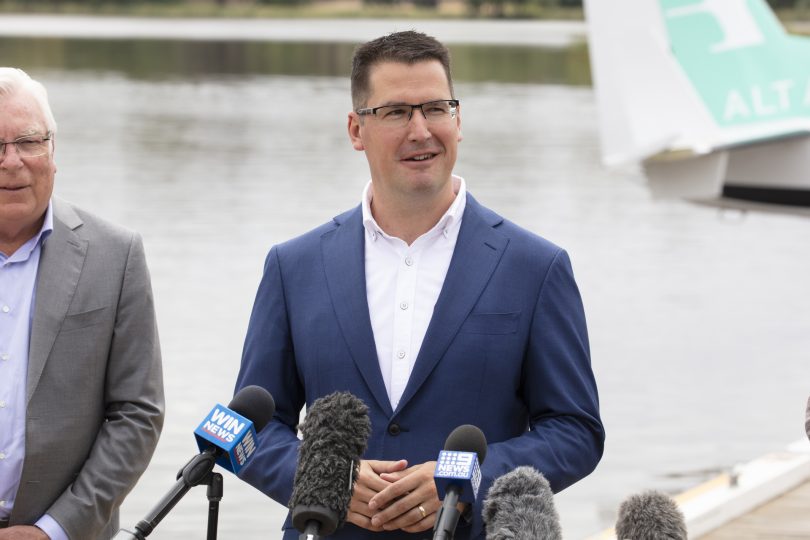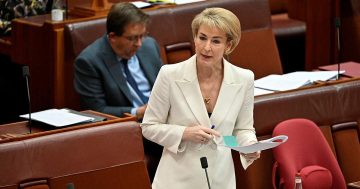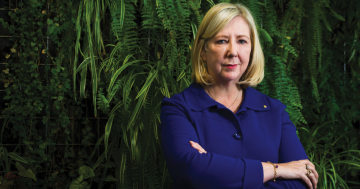
Senator Zed Seselja said he is open to considering giving the ACT the right to vote on euthanasia only if it is part of broader legislation. Photo: Thomas Lucraft.
ACT Liberal Senator Zed Seselja has indicated that he is open to giving the Territory the right to legislate on euthanasia, as long as the changes to the Self-Government Act were part of a broader push for expanded Territory rights.
The comments come after the ACT Minister for Human Rights, Tara Cheyne, wrote to the Federal Attorney-General imploring him to restore the right to legislate on euthanasia.
Ms Cheyne said the Territory’s inability to legislate on the issue was a contravention of Australia’s human rights obligations, a proposition that was supported by the ACT Human Rights Commissioner Dr Helen Watchirs.
Euthanasia was legal in the Northern Territory between 1996 and 1997 before the Howard Government passed the Euthanasia Laws Act in 1997, which repealed the right and amended both territories’ self-government acts, removing their ability to legislate on the issue.
But according to Dr Watchirs, the 1997 bill was never subjected to human rights scrutiny as it was introduced well before the establishment of the Parliamentary Joint Committee on Human Rights (PJCHR).
“However, the PJCHR can also examine current Acts for compatibility with human rights, and it would still be open to the PJCHR to assess the Act’s compatibility with human rights and whether it breaches Australia’s obligations under the International Covenant on Civil and Political Rights,” she said.
The issue was considered by the Senate in 2018 when a bill to restore the right was narrowly defeated.
Mr Seselja, who is opposed to euthanasia, said his views on the issue had not changed, but he would consider an ‘omnibus’ Territory’s rights bill that was not a single issue piece of legislation.
“If you compare us to other states, we have different legislative requirements. We have less Senate representation than others do. We have other restrictions, things like the ACT not being able to raise its own police force,” he said.
“If the Territory wants to have a discussion about the broader question of territory rights, then that is a discussion I am very open to.
“But if they put it in the context simply of a conscience vote on euthanasia, then it has been considered by the Senate and the [Federal] Parliament in the past.”
The original bill to remove both territories’ ability to legislate on euthanasia was a single-issue piece of legislation and, as with the repeal bill in 2018, was determined by a conscience vote.
A vote on a broader rights bill would be unlikely to follow the same path, Mr Seselja said.
“Federal Parliament would need to be convinced as a whole that it was a good idea. If that were to come before the Parliament, I assume it probably would not be a conscience vote,” he said.
But Ms Chenye was critical of the idea, saying that processes involved in an omnibus bill would only further delay any change.
“A proposal to consider an omnibus bill on Territory rights as a mechanism to achieve this outcome would be a distraction that will undoubtedly slow this process down significantly,” she said.
“It is absurd for the Commonwealth to maintain their position on Territory rights as it prevents Australian citizens in and the ACT and the Northern Territory from having the same rights as Australians living in other states.
“The most appropriate way for this matter to be progressed is for the Federal Parliament to repeal the [Euthanasia Laws Act] and give the Territories the same right as every other Australian Parliament to consider laws related to voluntary assisted dying and euthanasia.”
Ms Cheyne said further inquiries or interventions were not needed to know “that this situation is unjust”.
“There is one simple way for this to proceed and that is through a vote through both houses of Parliament to remove these provisions that impinge on our human rights,” she said.
Mr Seselja said he would defer comments regarding the human rights compatibility of the 1997 legislation to “other experts”.
Dr Watchirs told Region Media that if the ACT Government wants to try to circumvent the Federal Parliament repealing the original bill, it could explore whether there are any options to raise these concerns directly with the United Nations.
This could include lodging complaints with the UN Human Rights Committee or Council, she said.





















